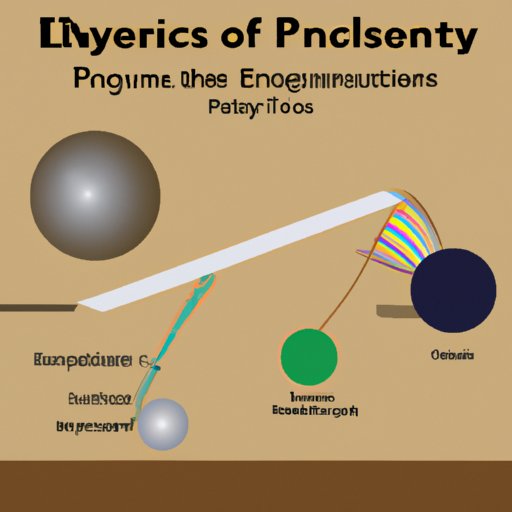
Introduction
Physical science is the study of matter, energy, and the fundamental forces that govern the universe. It encompasses a wide range of scientific fields, from chemistry to physics, that examine the world around us. Physical science is incredibly important as it provides the foundation for other scientific disciplines and helps us understand the natural world and its behavior. In this article, we’ll explore various aspects of physical science, including its branches, fundamental concepts and theories, and its relevance to our daily lives.
The Fascinating World of Physical Science: A Beginner’s Guide
Physical science is an umbrella term that encompasses several scientific disciplines. It’s the study of inanimate objects, matter, and energy. From atoms to the cosmos, physical science seeks to understand these phenomena and the natural forces that explain them.
Branches of Physical Science:
The main branches of physical science are chemistry, physics, astronomy, and geology. Chemistry is the study of matter at its most basic level, while physics deals with the behavior of matter and energy at a macroscopic level. Astronomy is the study of celestial objects outside our planet, and geology is the study of the Earth’s structure and composition.
Examples of Physical Science in Everyday Life:
Many of the products we use on a daily basis are the result of physical science research. From pharmaceuticals to automobiles and electronics, these innovations and technologies have significantly improved our quality of life. Physical science has also contributed to advances in alternative energy, construction, and transportation.
Unveiling the Mysteries of Physical Science for High School Students
Physical science provides an essential foundation for aspiring scientists, engineers, and technology professionals. It’s essential for high school students to master physical science concepts and understand how they apply to our everyday lives. However, many students struggle to grasp physical science concepts due to the abstract nature of the subject.
Importance of Physical Science Education:
Physical science education not only provides a strong foundation for further studies in science but also helps prepare students for future careers in technology and engineering. In addition, learning about physics and chemistry helps develop critical thinking and problem-solving skills that can be applied to any field.
Challenges Faced by High School Students in Learning Physical Science:
The abstract nature of physical science can make it challenging for high school students to comprehend. Many students struggle with math calculations, memorizing formulas, and visualizing concepts. In addition, boring lectures and lack of access to hands-on experiments can also discourage students from pursuing physical science.
Innovative Teaching Methods and Techniques to Make Physical Science Fun:
To overcome these challenges, physical science teachers are adopting innovative teaching methods and techniques. These methods include interactive labs and simulations, multisensory teaching techniques, and the use of technology in teaching. These methods help students better understand the concepts and make learning physical science more enjoyable.
The Importance of Physical Science in Advancing Technology and Medicine
Physical science is crucial in developing new technologies that improve our lives and advance scientific discovery. It has contributed to significant breakthroughs in medicine and has helped to shape modern society.
Examples of How Physical Science Has Contributed to Advancements in Technology and Medicine:
Physical science has contributed to the development of modern medicine, including the discovery and development of antibiotics and vaccines. It has also helped to make modern electronics and communications possible through the invention of transistors and semiconductors. Additionally, technologies such as solar power, wind turbines, and electric vehicles are all made possible due to advancements in physical science.
Future Potential of Physical Science in Solving Global Challenges:
Physical science research has the potential to solve some of the most pressing global challenges we face today. From climate change to energy shortages and disease, physical science can provide innovative solutions. This field of research is constantly evolving, and we can expect amazing breakthroughs in the future.

Exploring Physical Science: The Fundamental Concepts and Theories
Physical science includes several fundamental concepts and theories that help us understand the behavior of matter and energy in the universe. These theories provide the foundation for further studies in the field and have practical applications in everyday life.
Laws of Motion:
The laws of motion, developed by Sir Isaac Newton, describe the relationship between an object and the forces acting upon it. The first law of motion states that an object at rest remains at rest, while an object in motion remains in motion unless acted upon by an external force. The second law relates the force, mass, and acceleration of an object, while the third law states that for every action, there is an equal and opposite reaction.
Thermodynamics:
Thermodynamics is the study of energy and its transformations. It has practical applications in areas such as heating and cooling, power generation, and refrigeration. The laws of thermodynamics describe the behavior of thermal energy, including how it is transferred, its entropy, and how it changes from one form to another.
Chemistry and the Periodic Table:
Chemistry is the study of matter and its interactions. The periodic table, a cornerstone of chemistry, organizes the elements according to their properties. It provides a way to predict how elements will behave chemically and allows scientists to design new materials, medicines, and products.
Atomic Structure and Subatomic Particles:
Atomic structure is the study of the composition of atoms and the fundamental particles that make them up. This area of physical science includes research into the behavior of subatomic particles, including protons, neutrons, and electrons.
Other Important Concepts and Theories in Physical Science:
Other important concepts in physical science include electricity and magnetism, optics and light, and waves and sound. These concepts have far-reaching applications in fields such as telecommunications, energy production, and transportation.
Physical Science in Everyday Life: How It Affects Our Daily Routine
Physical science has a significant impact on our daily lives, from the electricity that powers our homes to the materials that make up the products we use. Understanding physical science can help us make informed decisions and appreciate the world around us better.
Electricity and Magnetism:
Electricity and magnetism play a significant role in our daily lives. From static electricity to the current that powers our homes and vehicles, electrical energy is critical to modern society. Magnetism is also important in the design of motors, generators, and appliances such as refrigerator magnets.
Optics and Light:
Optics and light are crucial in the design of electronic screens, eyeglasses, and cameras. They also play a significant role in modern medical imaging and diagnostic tools.
Sound Waves and Acoustics:
Sound waves and acoustics are essential in the design of speakers, headphones, and other audio equipment. They also have medical applications in imaging and diagnosis.
The Impact of Physical Science in Transportation:
Physical science plays a critical role in the design of modern transportation systems. From the aerodynamics of airplanes to the materials used in cars and trains, physical science research has led to faster, safer, and more efficient modes of transportation.
Teaching Physical Science: Innovative Methods and Techniques
Teaching physical science can be made more effective and engaging by adopting innovative teaching methods and techniques.
Interactive Labs and Simulations:
Interactive labs and simulations are designed to help students explore complex physical science concepts in a hands-on manner. These tools provide a more engaging and interactive learning experience.
Multisensory Teaching Techniques:
Research has shown that multisensory teaching techniques can significantly improve student learning and engagement. These techniques involve the use of multiple senses, such as sight, sound, and touch, to enhance the learning experience.
Use of Technology in Teaching Physical Science:
Technology has revolutionized the way we teach and learn physical science. Digital tools such as interactive whiteboards and online resources make learning more accessible and engaging for students.
Discovering the Marvels of the Physical Universe: An Introduction to Physical Science
Physical science has helped us understand the natural world around us and the fundamental forces that govern it.
The Origins of the Universe:
Physical science has contributed to our understanding of the origins of the universe, including the Big Bang Theory and the formation of planets and galaxies.
The Scale of the Physical Universe:
Physical science research has helped us better understand the scale of the universe, from subatomic particles to the vastness of space.
Types of Galaxies and Stars:
Astronomers use physical science to study the behavior and properties of galaxies and stars. This research can help us better understand our place in the universe.
Conclusion
Physical science is a fascinating field that helps us understand the natural world around us and provides the foundation for technological innovation and scientific discovery. It’s crucial to learn physical science concepts, not just for aspiring scientists and engineers but for anyone who wishes to better understand the world around us. We encourage everyone to explore the world of physical science further and to discover its amazing marvels.





